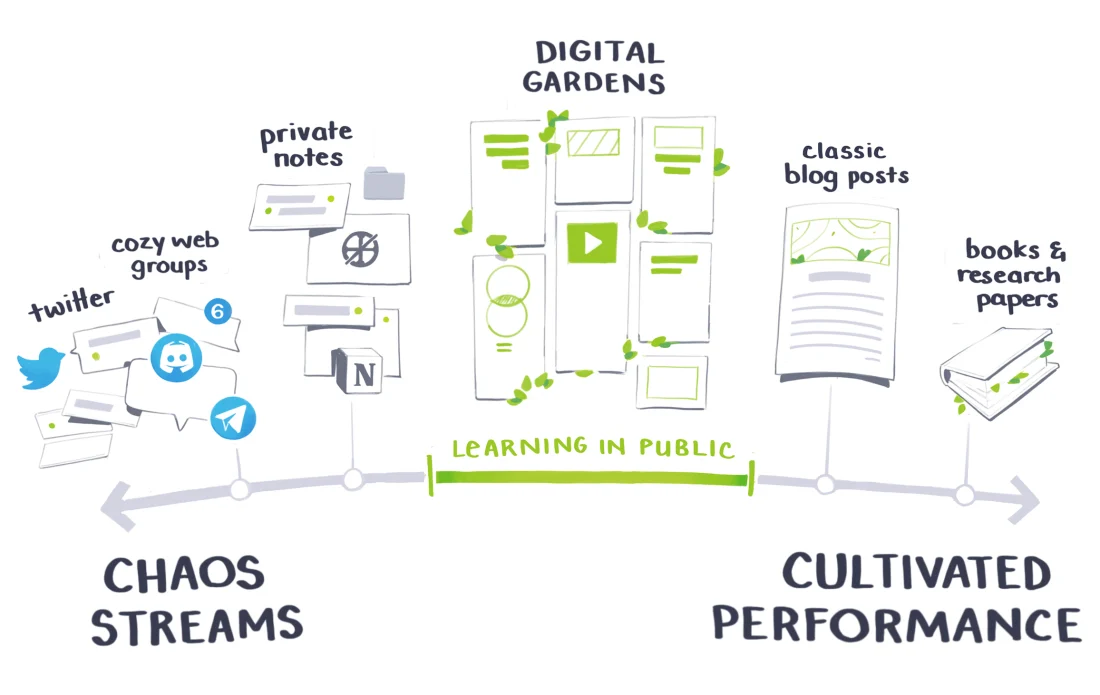Principles of digital gardening
Here are my notes on principles of digital gardening, as shared by Maggie Appleton.
But streams only surface the Zeitgeisty ideas of the last 24 hours. They are not designed to accumulate knowledge, connect disparate information, or mature over time.
The garden is our counterbalance. Gardens present information in a richly linked landscape that grows slowly over time. Everything is arranged and connected in ways that allow you to explore. Think about the way Wikipedia works when you're hopping from Bolshevism to Celestial Mechanics to Dunbar's Number. It's hyperlinking at it's best. You get to actively choose which curiosity trail to follow, rather than defaulting to the algorithmically-filtered ephemeral stream. The garden helps us move away from time-bound streams and into contextual knowledge spaces.
- Topography over timeline — “Many entry points but no prescribed pathways.” Organized via links, not a calendar (even though you may include date info on your pages).
- Always growing — “There is no ‘final version’ on a garden. What you publish is always open to revision and expansion (or more likely, contraction and clarification).”
- “Gardens are designed to evolve alongside your thoughts. When you first have an idea, it's fuzzy and unrefined. You might notice a pattern in your corner of the world, but need to collect evidence, consider counter-arguments, spot similar trends, and research who else has thunk such thoughts before you. In short, you need to do your homework and critically think about it over time.”
- Benefits (direct quotes)
- You're freed from the pressure to get everything right immediately. You can test ideas, get feedback, and revise your opinions like a good internet citizen.
- It's low friction. Gardening your thoughts becomes a daily ritual that only takes a small amount of effort. Over time, big things grow.
- It gives readers an insight into your writing and thinking process. They come to realise you are not a magical idea machine banging out perfectly formed thoughts, but instead an equally mediocre human doing The Work of trying to understand the world and make sense of it alongside you.
- Imperfection and learning in public — “The perfect blend of chaos and cultivation.”
-
“Digital gardening is the Domestic Cozy response to the professional personal blog; it's both intimate and public, weird and welcoming. It's less performative than a blog, but more intentional and thoughtful than a Twitter feed. It wants to build personal knowledge over time, rather than engage in banter and quippy conversations.”

-
You should indicate how “done” something is with status. An idea:
- 🌱 Seedlings for very rough and early ideas
- 🌿 Budding for work I've cleaned up and clarified
- 🌳 Evergreen for work that is reasonably complete (though I still tend these over time).
- “I also include the dates I planted and last tended a post so people get a sense of how long I've been growing it.”
-
- Gardens are “playful, personal, and experimental” — it should be unique to you!
- “The point of a garden is that it's a personal playspace. You organise the garden around the ideas and mediums that match your way of thinking, rather than off someone else's standardised template.”
- “Ideally, this involves experimenting with the native languages of the web – HTML, CSS, and JavaScript.” — recommended: https://www.khanacademy.org/computing/computer-programming/html-css
- Diversity of content and media format
- Independent ownership — don’t put your garden on a mass site out of your control. Make sure the format is easily exportable.